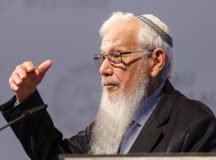Gidi Grinstein and Ari Afilalo argue that on the eve of Israel’s 70th anniversary, it must reembrace its vision of being the nation state of the entire Jewish People to preserve its exceptionalism.
In June 2017 the government of Israel cancelled the hard-fought ‘Kotel Compromise’. That agreement would have provided for an additional egalitarian prayer space at Jerusalem’s Western Wall, accessible to all non-Orthodox denominations without the traditional separation (mechitzah) between men and women. The Reform and Conservative movements, who represent the vast majority of American Jewry, had attributed great symbolic and political significance to this compromise, viewing it as an official recognition by the State of Israel of their legitimacy as branches of Judaism. In addition, the government announced its support for amendments to the Conversion Law, which would deny official recognition to conversions performed by rabbis who are not recognised by Israel’s Chief Rabbinate. Adding fuel to the fire, roughly at the same time, it was also revealed that the Chief Rabbinate had ‘blacklisted’ some Diaspora rabbis as untrustworthy. That list included not only rabbis who belong to the Reform and Conservative movements that have been long rejected, but also prominent Orthodox ones in the US and Canada.
These events sent shock waves throughout the Jewish world. While they are not the first crisis in the relations between Israel and World Jewry, they do represent a potentially dramatic watershed. While Israel-World Jewry relations have been eroding for decades among those less involved in the so-called ‘organised Jewish community’ or in active support for Israel, the current crisis struck at the heart of the Zionist, pro-Israel Jewish community. Indeed, many World Jewry leaders expressed frustration and outrage at Israel, both publicly and in private, and few went as far as suggesting ‘targeted boycotts’ of the government of Israel, or divestments from Israel altogether.
How worrying is this crisis? The answer to this question varies. Some believe that the relationship is resilient and that the crisis can be transcended. They point to uninterrupted financial support and to the continued success of major organisations that are dedicated to Israel, such as AIPAC. But the reality is that the fire is smoldering, as this crisis has been long in the making and is driven by deep and more powerful demographic and political trends. In the long-term, it is a detriment to both the state and World Jewry.
Reversing these negative trends requires a reimagining of World Jewry to address current and emerging realities. This process needs to take place primarily on the part of Israel to reflect an evident reality: unprecedented successes and powers usher in new responsibilities if Israel is to remain the nation-state of the entire Jewish People in the 21st century.
Israeli exceptionalism
Israel represents a bold political concept. Its founding ideology, Zionism, was formed in the late 1800s in order to serve the significant and continued existence of the entire Jewish People. Hence, if France is the nation-state of all French citizens, Israel is the nation-state not just of all Israeli citizens, Jews and non-Jews alike, including a 20 per cent Arab minority, but also of all Jews living outside of Israel. This is notwithstanding the fact that many of the non-Israeli Jews have not pledged any formal or ideological allegiance to it and a minority among them even opposes the idea of Israel altogether. These ideals were enshrined in 1948 in Israel’s Declaration of Independence and continue to inspire much of the outlook of many Israelis toward World Jewry. They establish Israel’s political and constitutional exceptionalism, a nation like no other nation.
Such aspirations and realities are covenantal. They are not based on a constitution, a contract or a treaty but rather on shared values. Nonetheless, they do carry significant practical implications. Primarily, they mandate that Israel’s Parliament, the Knesset and its executive branch hold themselves, and are held by others to be accountable to an entire constituency of Jews who are neither residents nor citizens of the State of Israel, and therefore are not voters. For example, this notion inspired the Law of Return that has been allowing every Jewish person to receive automatic Israeli residency and ultimately citizenship. It underlies Israel’s support of Jewish communities around the world in security, education and other matters.
At the same time, Israel’s essence as the nation-state of the Jewish People has driven world Jewry to extend remarkable economic and political support to it as if Israel was the subject of a global collective Jewish effort. It also legitimates the involvement of World Jews in what may seem to be ‘internal’ Israeli matters, such as arrangements relating to religious affairs or the well-being of Israel’s Arab minority. Naturally, most Israelis embrace the former and even take it for granted, but many reject the latter. Their outlook has been shaped by so-called ‘classical Zionism’.
The rise of and challenge to the classical Zionism
For the past decades, the relationship between Israel and World Jews has not been one of equals. So-called ‘classical Zionism’ viewed Diaspora Jews as living a Jewish life that is ideologically inferior to that of Zionists in the Land of Israel and dismissed their legacy as an unending ordeal of misery, personal and communal insecurity, and poverty. The destiny of World Jewry was discarded as vulnerable to inevitable antisemitism and mass-assimilation, and therefore their existence was seen as temporary and their well-being was doomed to decline. For the sake of the Jewish People and their own, Diaspora Jews should immigrate to Israel. Consequently, one of the chief goals of Zionism and the State of Israel was framed as the ‘ingathering of the exiles’. Indeed, during its first decades of existence, millions of Jews immigrated to Israel and entire Diaspora communities, some of which had existed for centuries and even millennia, repatriated to their ancestral homeland.
This outlook, known as the ‘negation of the Diaspora,’ increasingly became accepted and dominant throughout the Jewish world. Nazi persecutions and the Holocaust in 1933-1945 were seen as its ultimate historical and moral validation. But it was not until the astounding victory in 1967 that Zionism ascended to become the leading movement of the Jewish People. Henceforth, with a few exceptions on the Right and the Left, the leadership of World Jewry accepted this outlook, so much so that its communities underwrote thousands of immigration emissaries – shlichei aliyah – who came from Israel with the mission of dissolving Diaspora communities and helping all their members move to Israel.
Fifty years later, at the beginning of the 21st century, Diaspora Jewry is evidently more resilient than classical Zionism anticipated. Most of the remaining Diaspora communities are flourishing and American Jewry is probably the most influential and prosperous Jewish community in history. Moreover, hundreds of thousands of Israelis have chosen to move to the Diaspora and together they create an unprecedented and previously inconceivable phenomenon of an Israeli Jewish Diaspora.
Nonetheless, classical Zionism continues to prevail as the driving Israeli outlook on the Jewish People. It continues to hold that neither Israel nor the Jewish People needs a Diaspora, which is not viable in the long-run. Yet, this outlook naturally breeds arrogance toward and ignorance of World Jewry among Israeli civic and political leadership. It is suffice to explore the composition of Israel’s National Security Council, whose members rarely possess a deep insight into – or understanding of – World Jewry.
This tension exploded last year when the actions of the government were experienced by World Jewry as dismissive, bordering on abusive. The domineering narrative coming out of Israel was suddenly no longer acceptable among many thriving Jewish communities, whose leaderships, memberships and younger cohorts refused to be treated as second-class within the Jewish People. Shaking off their inferiority complex, they stood up to demand a discourse of equals in terms of their place in the history of the Jewish People and in its future.
Many conveniently view this crisis in the relationship between Israel and World Jewry as emanating from and the responsibility of ‘both sides’. They call for ‘discussion’ and ‘engagement’ based on civility, moderation and mutual respect. There is no doubt that these calls are worthy, but they also hide the true nature of this schism, which is about realignment of power within the Jewish World. In other words, World Jewry is communicating to Israel’s leadership that existing patterns of conduct cannot prevail without consequences, that its outlook must be more modest and that the use of its legislative and executive power must be more restrained and nuanced. This means that the heart of the adaptive work must take place among Israeli Zionists, who must embrace a new vision that holds equal standing of ‘in-Zion’ and ‘out-of-Zion’ Jewries in today’s Jewish world.
Towards a new paradigm of Israel-World Jewry relations
The ideological cornerstone of such a new Zionist vision should be that Israel and World Jewry are an integrated global society, both having an equal moral standing and crucial significance for the future of the Jewish People. A vibrant Diaspora is not only important for Israel’s interests of economic well-being, security and international legitimacy, but is also integral to Israel’s purpose. Furthermore, the gathering of all Jews in Israel may be a disservice to the continued existence of the Jewish People and therefore to the mission of Zionism. Hence, continued significant existence of World Jewry is a Zionist imperative rather than a Zionist compromise. This notion existed in the past, such as in the works of A.D. Gordon in the early 20th century, but is now more relevant than ever before, as the centre of power in the Jewish world gravitates toward Israel.
Change must happen among the leaders of World Jewry as well. Rejecting the Israeli stance on the ‘Kotel Compromise’ and conversion issues should be complemented with a coherent narrative that is as powerful and unapologetic as that of classical Zionism, standing tall and proud of the Diaspora’s legacy and its legitimate place in the Jewish future. They must be confident that vibrant Diaspora Jewish life is as essential as Israel for a resilient and prosperous Jewish world and that both are true to the essence of Zionism and to the ethos of Israel.
There are solid historical foundations for the vision of Israel and the Diaspora as one integrated society. The first emanates from the notion of Jewish Peoplehood, which permeates Jewish thought since the Book of Exodus. As Avraham Infeld explains in his recent book Passion for a People, Jews are a family and a tribe, whose unity transcends its diversity and even internal adversity. Hence, communities like the anti-Zionist Satmers, US Reform Jews, and Israeli settlers are equally Jewish notwithstanding their diametrically opposed ideologies. Hence, ‘in-Zion’ and ‘out-of-Zion’ experience are also integral to the narrative of the Jewish People, notwithstanding the moral superiority of life in Zion that obviously exists in the Jewish religion.
Second, Jewish life outside of the Land of Israel – which has been continuous for 26 centuries – may be as resilient as Jewish sovereign existence, if not more. World Jewry is organised as a network of communities that permanently evolves in response to ever-changing technological, political and economic realities, while Jewish population gravitates around the world in pursuit of security, prosperity and freedoms. It is a matter of historical fact that World Jewry as a whole has survived and thrived, despite the rise and fall of individual communities and massive setbacks such as the Shoah or the expulsion from Spain. This history and structure confidently supports the prediction that hundreds of years from now, Jews will still be lighting Shabbat candles around the world. In other words, the structure of Diaspora Jewish society deserves deep respect by Israel’s leaders, since it is probably the most resilient in human history.
Third, Jewish contributions to humanity happened primarily outside of the Land of Israel. Indeed, Israel’s contribution to the world has been significant, outsized and distinct. But this is a recent phenomenon of the past few decades. Meanwhile, in the absence of sovereignty, World Jewry created remarkable ethics-based communities not only in thought but also in practice through a robust system of institutions of welfare, law, education, and other services, which have been embraced by many societies and inspired humanity.
Fourth, relations between ‘in-Zion’ and ‘out-of-Zion’ Judaism have been mutually reinforcing. Symbolically, the Torah was given in Sinai, out of Zion, and Hillel the Elder came to Jerusalem from Babylon with a vision that would transform Judaism to create so-called rabbinical Judaism. The Babylonian Talmud overshadows the Jerusalem Talmud as the leading Halachic text and nowadays rabbinical thought leadership and innovation are also ceaselessly emanating from the Diaspora and not just from Israel. Clearly, the State of Israel would not have not been created and thrived without the commitment of Diaspora Jewry, and today both societies support each other in countless ways, including security, education, legitimacy, and business.
A 21st century agenda for Israel-World Jewry relations
Once this essential outlook is formed, the question becomes: what should be the new agenda for Israel-World Jewry relations? It is a challenge of political balancing act. Israeli exceptionalism means that Israel must find ways to operate its democratic institutions, serving its citizens and residents, while adhering to its ethos as the nation-state of Jews worldwide. This tension has implications for the workings and actions of Israel’s government and legislature.
Israel accepting and respecting all Jewish denominations is clearly a cornerstone of such a vision. Consequently, a compromise around the Kotel must be found again and the blacklisting of rabbis cannot happen. But what else? How do we work our way ‘back from a future’ when Israel credibly remains a nation state for the entire Jewish People?
The first principle is significance. It calls for the government to uphold its relations with World Jewry as a matter of highest national security. Many may say that this is naturally the case. Notwithstanding the important and often revolutionary work of the Ministry of Diaspora Affairs and the efforts of the Ministry of Foreign Affairs through its diplomatic missions around the world, the reality is that the government has no official vision for this relationship, nor is there an institution with the power to coordinate and oversee the operations of Israel’ governmental agencies in this area.
The second principle relates to areas where the Knesset or the government must exercise self-restraint. These include conversions, kashrut, and other aspects of religious observance. In other words, the assertion of Israel’s sovereign legislative and executive power should have self-imposed limits in areas where it risks compromising the well-being of World Jewry. Israel’s top-down legislation and policy-making on such matters is inconsistent with the way the Jewish People has been evolving. Such matters obviously need to be legislated upon, but such legislation should be left to the jurisdiction of local communities and municipalities.
The third principle calls for a dialogue of equals. As mentioned, the onus is on both sides, albeit in different ways: classical Zionism must forgo its narrative of dominance and World Jewry leadership must assert their legitimacy as an equal contingent of the Jewish world. This fundamental change would have many concrete manifestations. For example, the Israeli education system must incorporate a narrative of Jewish peoplehood that is respectful of world Jewry, and Israel’s civil service leaders must have recurring immersive experiences among Jewish communities to ensure deep acquaintance with World Jewry. Some people refer to this idea as a ‘reverse birthright’ programme.
Fourth, there needs to be a shared vision for making a significant and unique contribution to humanity in the 21st century. For the first time in its history, the Jewish People is able to contribute to humanity not only qualitatively, through values and ideas, but also quantitatively by improving the lives of many millions of people through the use of technology. That ability must be translated into a commitment and a partnership, which is shared by all Jewish communities and the State of Israel, to making an outsized contribution to humanity.
Finally, much of the future of the relations between Israel and World Jewry depends on the strength of the institutions of the Jewish community. In most cases, the well-being of these institutions depends on their being non-partisan or bipartisan. Against this backdrop, the perception of the government as taking sides in internal political disputes primarily in the US can be highly detrimental to the cohesion of the community and its relations with Israel.
In this context, American Jewry stands out because of the awesomeness of the institutions it has created to support, its own relations with Israel, and the strategic alliance of the US and Israel, which enjoys deep bi-partisan support. A web of institutions has been integral to the political miracle of that alliance, but chief among them is AIPAC, which stands out as a unique creation of American Jewry. AIPAC’s mission requires it to be bi-partisan and its well-being and ability to remain so is vital for the future of Israel-World Jewry relationship.
In 2018, the Jewish People is probably more powerful and influential than ever before. Less than 80 years after the Holocaust, a global network of prosperous communities are being supported by the State of Israel, which is a diplomatic, military and economic powerhouse. This remarkable achievement is an outcome of nearly 15 decades of joint efforts of World Jewry and Zionists in the Land of Israel.
As we look into the future, a covenant of destiny must now bind Israel and World Jewry, beyond their respective self-interests. Israel’s purpose of being the nation state of the Jewish People is what makes it exceptional, but the meaning of this powerful covenantal idea has been evolving since the inception of Zionism. Now, as Israel turns 70, the essence of this new chapter must be that Israel and World Jewry are an integrated global society, interconnected and interdependent, with the mission of making a distinct and outsized contribution to humanity.








































